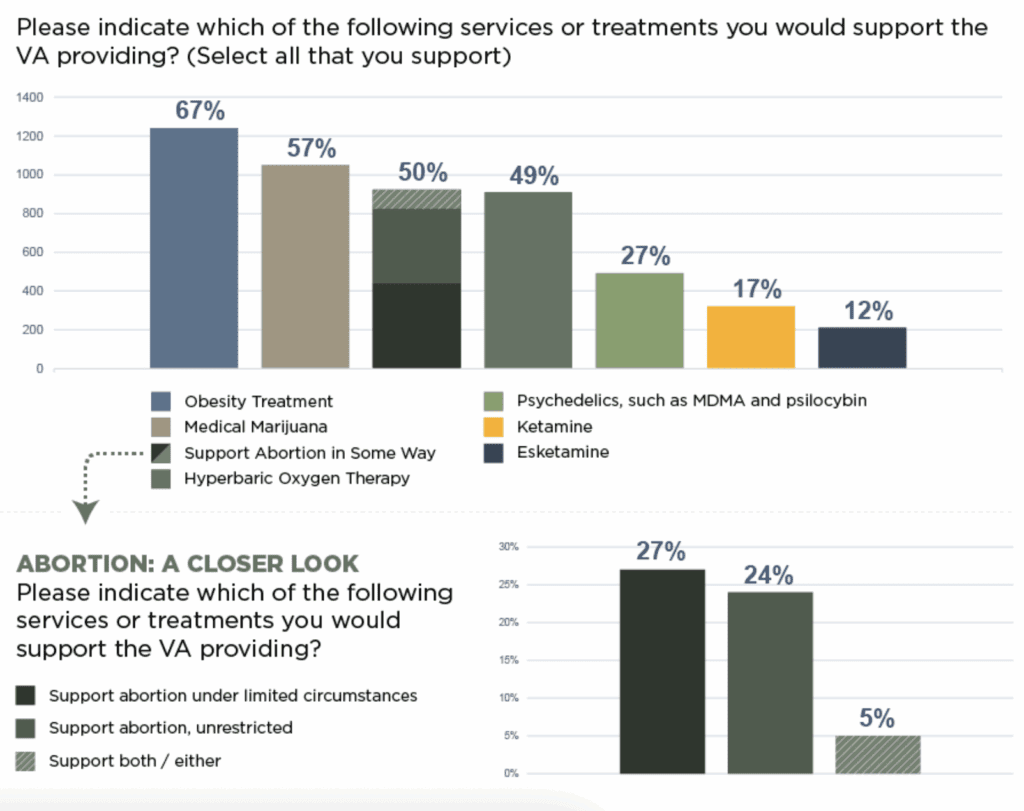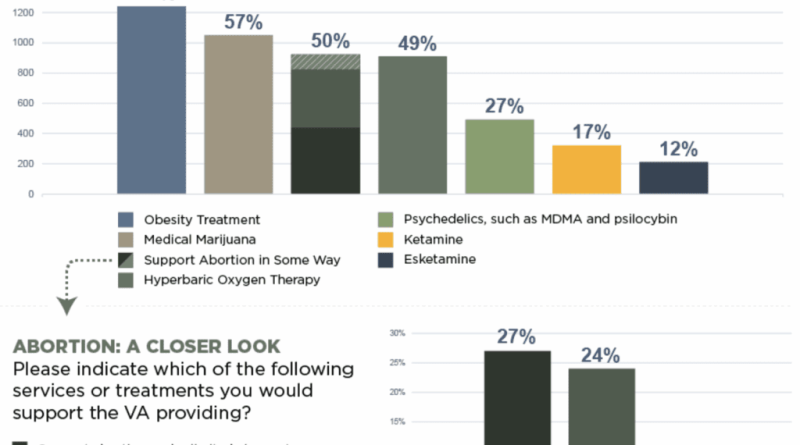Most Veterans And Their Family Members Say VA Doctors Should Be Able To Provide Medical Marijuana, Poll Shows
From toxifillers.com with love
A new survey of veterans and their families finds that a majority—57 percent—feels the U.S. Department of Veterans Affairs (VA) should provide medical marijuana to eligible patients.
A smaller proportion of respondents said they felt VA should provide psychedelic treatments, such as MDMA or psilocybin (27 percent), while 17 percent supported VA-provided ketamine and 12 percent supported access to a similar drug, esketamine.
The poll was conducted by Mission Roll Call, a nonprofit that represents veterans. Results come from “nearly 2,000 responses from all 50 states, and 95% of respondents are either a veteran or a family member of a veteran,” the group said.
The questions about VA-provided substances like medical marijuana and psychedelics were part of a question around “novel treatments.” Others included obesity treatment, abortion and hyperbaric oxygen therapy.

Mission Roll Call
“In general the respondents to our survey support the inclusion of novel treatments for ailments,” Mission Roll Call said in its report on the survey’s findings. The group added that it’s “working with several partners to introduce initiatives to help veterans where the research and results support it,” pointing specifically to hyperbaric oxygen therapy.
Early last year, a separate Ohio State University (OSU) survey found that six in 10 active duty military service members and veterans—as well as 85 percent of military family members—supported legalizing marijuana.
Along the lines of the new poll, that survey found that fewer veterans—four in 10—favored legalizing psychedelics, at least for recreational use. Among family members and non-military respondents, meanwhile, 59 percent and 61 percent, respectively, supported the change.
Support among veterans was markedly higher when it came to doctor-recommended use of marijuana and psychedelics, which an earlier OSU study discussed.
That paper found 72 percent support among veterans for Department of Veterans Affairs (VA) doctors to be legally allowed to recommend marijuana and 64 percent support when it came to psychedelics.
Separately, VA officials recently announced they’re looking for contractors to analyze and explain scientific evidence on medical marijuana to clinicians and the general public as part of an ongoing project.
The work aims to evaluate and allow VA to more clearly communicate cannabis’s potential benefits for conditions like PTSD as well as potential risks around cannabis use disorder and consumption during pregnancy.
As VA explained in an earlier filing, about 9 percent of military veterans reported using cannabis in the past year, and about 40 percent of those said they used marijuana to treat medical conditions. The trouble comes when veterans try to talk to VA doctors about use of the drug.
“In short, clinicians will encounter patients who are using cannabis or who have questions about using cannabis,” VA said. “Discussions about cannabis are challenging in part because evidence examining the benefits and harms of cannabis is growing and changing rapidly, and because of the variability in the way the existing evidence base has been interpreted.”
Earlier this month, meanwhile, a military veteran who’s become an advocate for psilocybin access met with VA staff, and the secretary himself, to discuss the therapeutic potential of psychedelic medicine for the veteran community.
The visit came as VA Secretary Doug Collins continues to promote psychedelics as a possible alternative treatment option for those suffering from serious mental health conditions such as post-traumatic stress disorder (PTSD).
Collins, for example, disclosed last month that he had an “eye-opening” talk with U.S. Department of Health and Human Services (HHS) Secretary Robert F. Kennedy Jr. about the therapeutic potential of psychedelic medicine. And Collins said he’s open to the idea of having the government provide vouchers to cover the costs of psychedelic therapy for veterans who receive services outside of VA as Congress considers pathways for access.
During a Senate committee hearing this month, he separately reiterated his commitment to exploring the efficacy of psychedelic therapy to address serious mental health conditions that commonly afflict military veterans.
Bipartisan congressional lawmakers also recently asked the VA head to meet with them to discuss ways to provide access to psychedelic medicine for military veterans.
In a letter sent to Collins, Reps. Lou Correa (D-CA) and Jack Bergman (R-MI)—co-chairs of the Congressional Psychedelic Advancing Therapies (PATH) Caucus—said they were “encouraged by your recent remarks about the importance of pursuing research into psychedelic treatments and other alternative treatments to improve Veterans’ care.”
Correa and Bergman separately introduced a bill last month to provide $30 million in funding annually to establish psychedelics-focused “centers for excellence” at VA facilities, where veterans could receive novel treatment involving substances like psilocybin, MDMA and ibogaine.
Bergman has also expressed optimism about the prospects of advancing psychedelics reform under Trump, arguing that the administration’s efforts to cut spending and the federal workforce will give agencies “spines” to tackle such complex issues.
In December, VA separately announced that it’s providing $1.5 million in funding to study the efficacy of MDMA-assisted therapy for veterans with PTSD and alcohol use disorder (AUD).
Last year, Rachel Yehuda, who has overseen some psychedelic research as director of mental health at VA’s James J. Peters Veterans Affairs Medical Center, also touted an initial study the agency funded that produced “stunning and robust results” from its first-ever clinical trial into MDMA therapy.
In January, former VA Under Secretary for Health Shereef Elnahal said that it was “very encouraging” that Trump’s pick to have Kennedy lead HHS has supported psychedelics reform. And he hoped to work with him on the issue if he stayed on for the next administration, but that didn’t pan out.
Legalizing Marijuana Reduces The Cost Of Workers’ Compensation Claims And Lowers Prescription Drug Use By Patients, Study Shows
The post Most Veterans And Their Family Members Say VA Doctors Should Be Able To Provide Medical Marijuana, Poll Shows appeared first on Marijuana Moment.

